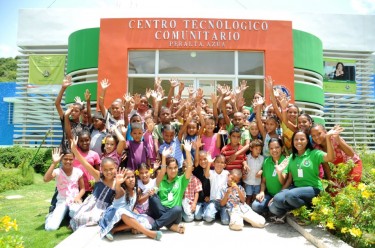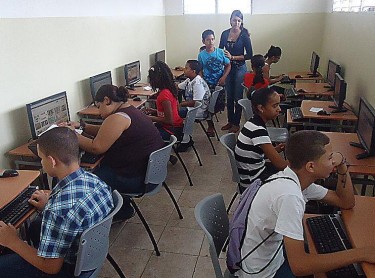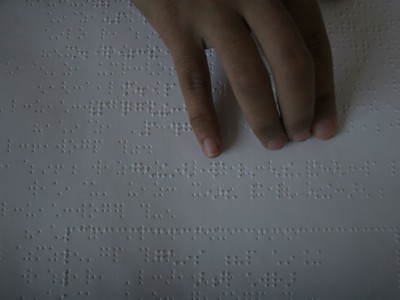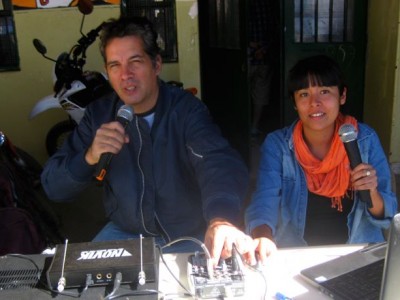[All links lead to Spanish-language webpages unless otherwise noted.]
In an area of the Dominican Republic where poverty is rampant, illiteracy is commonplace, and clean drinking water is not even a guarantee, residents can now count on free access to a computer and the Internet.
The country's Vice President, Margarita Cedeño de Fernandez, inaugurated one of the latest community technology centers, known as CTCs, in this municipality of San Antonio de Guerra in February, with four more opening in the months that followed.
The bright orange and green centers are part of a nationwide effort to bring computer and Internet access to even the most remote corners of the Dominican Republic, a 13-year old project that has blossomed under Cedeño de Fernández. So far, there are 93 of these community centers throughout the Dominican Republic.

Children and staff post in front of a community technology center in Peralta Azua, Dominican Republic. Photo from the official Facebook page for Centros Tecnológicos Comunitarios.
According to the latest data [en] from the World Bank, about 40 percent of the country lives below the poverty line. The country also records a 15.1 percent rate of unemployment rate [en].
And only 35.5 percent of the population have access to the Internet, according to a United Nations report last year.
With education as a central focus, the CTC initiative aims to tackle these problems, offering computers for the community to use in addition to courses in reading and digital literacy, a community radio station, English immersion classes, a childcare center, a library, meeting rooms, and even programs in gardening vegetables.
The vice president addressed the heart of the program during her inauguration speech for the center in San Antonio de Guerra, known simply as Guerra, which perhaps appropriately means “war” in Spanish:
Desde hoy Guerra le hace la guerra al analfabetismo, a la pobreza, al ocio y a la exclusión. Desde hoy estamos abriendo una guerra contra las inequidades sociales que se producen por la falta de espacios y de oportunidades que ustedes deben de tener para desarrollar sus habilidades y sus competencias, y así propiciar una vida digna y productiva como la que merecemos como seres humanos
In a world where the Internet is becoming mandatory for economic success, the CTCs are a leg-up for the less-fortunate, wrote Amaury Ortega Chestaro, an information technology specialist who works for the CTC project, in an editorial published on March 30, 2013 on Dominican newspaper El Nuevo Diario:
[…] con ese ideal, esa visión y ese enfoque fueron creados los centros tecnológicos comunitarios, pensando en los que tienen menos para de una forma o de otra insertarlos al mundo globalizado, competitivo y a la herramienta más poderosa actual que es la que está moviendo al mundo, EL INTERNET.

A group of young people in a community technology center in Cutupú, Dominican Republic learning how to read books online. Photo from @CTCCutupu Twitter account.
But much more is required than a speedy Internet connection for these centers to do good — they rely on the support of the community. Rosa Maria Hernandez, who lists herself on Facebook as an administrative manager for a CTC, assessed the feeling among those who work in the centers in a comment on Ortega Chestaro's editorial:
las personas que estamos involucradas en este proyecto es porque tenemos un sentido de pertenencia de masiado grande por nuestra comunidad, que nos sentimos 100% comprometido a su desarrollo e integración de las familias dominicana
The increasing momentum behind the project hasn't gone unnoticed. In 2011, Wikipedia founder Jimmy Wales paid a visit to a CTC in the southern coastal city of Boca Chica and promised to send the initiative a team of collaborators to teach them the ins and outs of editing Wikipedia.
And the Bill and Melinda Gates Foundation in 2012 awarded [en] the effort with its Access to Learning award of one million US dollars:
In partnership with the foundation, Microsoft donated [en] 18 million US dollars worth of software to the CTCs, and on April 9, 2013 the company's Dominican Republic branch signed on to collaborate with the CTC initiative to support programs that help young people become technologically savvy.
The digital divide in the Dominican Republic is particularly stark when it comes to the country's women — about three-fourths of the female population don't use the Internet. The CTC effort has a particular focus on empowering women and people with disabilities.
On March 19, 2013, 700 women graduated from literacy and technological education programs within the centers, and about a month later, the vice president gathered 150 girls for a chat on technology to promote its use among the students.
The program also works with the Partnership in Opportunities for Employment through Technology in the Americas (POETA), an organization that gives people with disabilities job training so that they can be more active in their communities.
The centers appear to be popular throughout the country, even a source of pride for rural communities, and online commentary tends to be positive. Commenting on a story about the new center in Guerra on news website listindiaro.com, “carolinaberas” wrote:
Una herramienta excelente para el apoyo de los estudiantes y que tengan más fuentes de información.
On El Nuevo Diario, another user responded to the news of the Guerra CTC:
Excelente proyecto para motivar la educación dominicana, a continuar con su desarrollo.
But are the centers making a measurable difference in the fight against digital illiteracy? It appears so [en]. A 2009 study by Paulo Prado from the University of Miami found that the Dominican CTC model “successfully promoted digital literacy through the use of [information and communication technologies] in the rural communities it serves”:
The CTCs were thus found to address, in multiple ways, the information and self-improvement needs and
goals of individuals in remote rural areas of the Dominican Republic.
Marco Antonio Linares sums up that idea. Linares was 15-years-old at the time when he was interviewed about his education at a CTC for a short documentary in 2007 available on YouTube:
Me siento bien porque he aprendido mucho. Yo no sabía nada y ya sé muchísimas cosas.
I feel good because I've learned a lot. Before I knew nothing and now I know lots of things.



